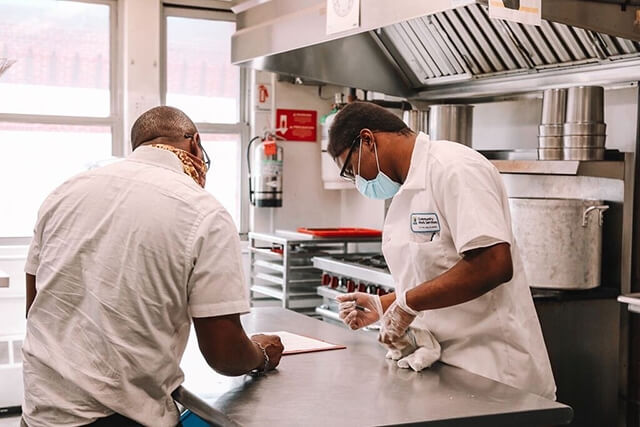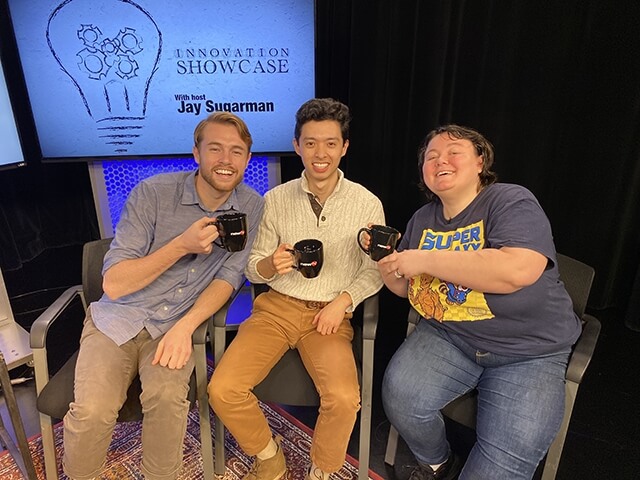News
Connor Schoen is co-leading an effort to empower homeless youth to produce meals and deliver them to front-line medical workers, shelter staff, and others in need in the greater Boston area. (Photo courtesy of Connor Schoen)
In early March, Connor Schoen oversaw the start of construction work in the Boston storefront that would soon become Breaktime Café—his long-envisioned social enterprise that seeks to create opportunities for young adults experiencing homelessness.
But almost as quickly as it began, work on the cafe ground to a halt—the COVID-19 pandemic rapidly intensified and the city shut down.
“Those first couple of weeks were pretty tough because we work with a lot of young adults and we couldn’t get in touch with many of them. A lot of these young adults lacked access to the technology they would normally use in the Boston Public Schools or libraries. A lot of them were overwhelmed by the situation, and some of them had been displaced and were still trying to figure things out,” said Schoen, A.B. ’20, an applied math concentrator at the Harvard John A. Paulson School of Engineering and Applied Sciences. “I felt powerless. I wished there was some way I could support the young adults we work with.”
At the same time, Schoen was worried about his older brother, Matt, who worked on the front lines at a Brigham and Women’s Hospital COVID-19 ICU. Schoen’s brother and his coworkers were already overstretched, and on top of it all, they were struggling to get meals during long, stressful shifts.
Schoen and co-founder Tony Shu, A.B. ’21, decided they had to do something. With access to the commercial kitchen at Community Work Services, located above the under-construction Breaktime Café, and a staff of youth who had already been trained for food service, they launched the Breaktime Double Impact Initiative to produce meals and deliver them to front line medical workers and shelter staff.
After obtaining funding from Off Their Plate, an organization that provides grants to restaurants that feed health care workers, Schoen, Shu, and their staff fired up the kitchen again on April 27.
With a group of four young adults who had already been trained to work in the café and several individuals from the CWS culinary training program, they began producing and delivering 1,500 meals per week to Boston hospitals.
Young adults work in the commercial kitchen. (Photo provided by Connor Schoen)
It felt good to be doing something to help, but Schoen knew they could do more; the kitchen had a capacity to produce 5,000 meals a week.
“There is a real need among people who live at shelters. There are also community members who tested positive for COVID-19 and can’t leave their homes, but also can’t prepare meals for themselves,” he said. “And on the outskirts of Boston, many communities have lacked stable access to food for a long time, and now they are really being left behind. COVID-19 has disproportionately affected communities of color and low-income Americans, and this motivated me to innovate new strategies of uplifting and empowering these communities.”
So Schoen and his team started reaching out to the cities of Boston, Everett, Chelsea, Lynn, and Brockton and found that there was a dire need for meals in these communities. In partnership with Community Work Services, the Breaktime team continued to ramp up production and started delivering 300 meals a day to both Everett and Chelsea. They have now hired 10 young adults and served 15,000 meals.
Since Lynn and Brockton are too far for delivery (all the meals are delivered hot), the Breaktime team is working to partner with existing nonprofit organizations to create opportunities for at-risk youth who live in those communities.
COVID-19 has disproportionately affected communities of color and low-income Americans, and this motivated me to innovate new strategies of uplifting and empowering these communities.
The café’s head chef provides virtual culinary training to youth, and then the Breaktime staff help the local organizations get funding, set up a distribution network, and start producing and delivering meals.
Schoen is hoping to continue to scale up by partnering with the City of Boston to produce 50,000 meals this summer.
As the initiative grows, he is quick to point out that youth are driving the project.
Double Impact Initiative staff make a meal delivery. (Photo courtesy of Connor Schoen)
“It is so cool to see how these young people that we’ve hired, who are generally put down as being of less value, or not having high potential, are showing the world that they’re incredibly valuable, they’re not disposable, and they have so much to offer,” he said. “They really stepped up to the job, figuring out how to run a cooking line and a distribution system to all these different sites. They’ve been at the center of our entire operational process, and it is really the young people in the kitchen that are making this work on the ground.”
For Schoen, who graduated a year early so he could devote more time to Breaktime, it is exhilarating to keep up with the daily changes that impact the group’s work. The invaluable lessons he learned as a Cheng Social Innovation Fellow at the Harvard Kennedy School, and the support he’s received as a 2020 Carl and Lily Pforzheimer Public Service Fellow have helped him drive Breaktime forward.
He’s also grateful for how the SEAS community has supported his dual passions of data science and public service.
“I will continue using the analytical skills I learned at Harvard to inform how I go about addressing structural inequities in the world,” Schoen said. “I think every effective leader needs to be ‘data fluent’ and capable of translating quantitative insights into impactful policy reform.”
Schoen, co-founder Tony Shu, and Breaktime Cafe board member Erica Tetzaguic (Photo courtesy of Connor Schoen)
With so much uncertainty, he’s not sure what the future holds, or where the Double Impact Initiative will end up next. But for now, he and his staff members are continuing to apply their skills to the cascading effects of the COVID-19 pandemic.
Schoen and Shu still hope to open the café in 2021, if it is safe to do so. When they do open their doors, they’ll draw on the lessons they learned this summer—about flexibility, grit, and innovation—but also stay true to the mission that has grounded them since the beginning.
“The trend line throughout all of this is our intention to create good-paying, career-launching jobs for the young adults we serve, and leverage those opportunities to empower communities through a grassroots movement,” he said. “That foundation has really blossomed over the last four weeks, just not the way I thought it would last summer. The most inspiring part for me is to see how the young people we work with have become so motivated and are working so incredibly hard because they know that their work is directly impacting the communities they really care about.”
Cutting-edge science delivered direct to your inbox.
Join the Harvard SEAS mailing list.
Press Contact
Adam Zewe | 617-496-5878 | azewe@seas.harvard.edu



